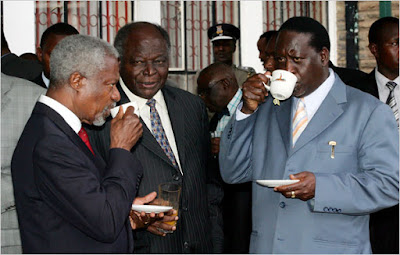
 NAIROBI, Kenya: Jan. 29th. (CNN) -- Kenyan police say that -- despite political disputes that have plunged this once stable country into chaos -- its officers have not been given shoot to kill orders. Some media organizations reported that the order had been issued to stem the tide of violence that has swept over the East African country since the disputed December 27 election -- and one that shows no signs of abating. But police spokesman Eric Kiraithe told CNN Wednesday his department had not issued a shoot-to-kill order but rather it had instructed officers "as much as possible to disable to effect detention" rather than kill. The law, Kiraithe said, allows an officer to fire his gun if armed men do not comply with orders to lay down their weapons. Kiraithe said that law enforcement received fresh instructions on when they can legally kill because the government wants to ensure the officers are neither accused of standing by or charged with homicide during violent confrontations. The government, Kiraithe said, wants "trouble makers" to understand they cannot act with impunity, attacking, burning and killing, that they cannot hide behind political parties.
NAIROBI, Kenya: Jan. 29th. (CNN) -- Kenyan police say that -- despite political disputes that have plunged this once stable country into chaos -- its officers have not been given shoot to kill orders. Some media organizations reported that the order had been issued to stem the tide of violence that has swept over the East African country since the disputed December 27 election -- and one that shows no signs of abating. But police spokesman Eric Kiraithe told CNN Wednesday his department had not issued a shoot-to-kill order but rather it had instructed officers "as much as possible to disable to effect detention" rather than kill. The law, Kiraithe said, allows an officer to fire his gun if armed men do not comply with orders to lay down their weapons. Kiraithe said that law enforcement received fresh instructions on when they can legally kill because the government wants to ensure the officers are neither accused of standing by or charged with homicide during violent confrontations. The government, Kiraithe said, wants "trouble makers" to understand they cannot act with impunity, attacking, burning and killing, that they cannot hide behind political parties.The spasm of political violence that has crippled Kenya erupted soon after the December elections, when the opposition Orange Democratic Party accused President Mwai Kibaki of rigging the vote to win re-election in a race against its leader Raila Odinga. It soon took on ethnic overtones. More than 860 people have been killed and more than 200,000 displaced in the turmoil, the Red Cross said. The Red Cross has put the number at 863. There was no fresh violence reported in Kenya Wednesday. The United States has said it will consider imposing sanctions against members of the Kenyan government and opposition figures who are instigating the violence. Earlier Wednesday, an American diplomat described the violence in Kenya's Rift Valley as "clear ethnic cleansing" aimed at chasing out members of the Kikuyu tribe who are loyal to President Kibaki. However, U.S. envoy Jendayi Frazer, who made the comments at an African Union summit in Addis Ababa, said she did not believe the ethnic clashes that have brought Kenya to its knees following disputed elections last month could be classed as genocide. "The aim originally was not to kill, it was to cleanse, it was to push them out of the region," she said, according to The Associated Press.
Asked about Frazer's comments, State Department spokesman Sean McCormack said they did not represent Washington's official position. He stressed that the State Department's Office of War Crimes Issues continues to closely monitor the post-election violence between Kenya's ethnic groups for "any incidence of atrocities" and is documenting all cases being brought to its attention. He described the violence in Kenya as a "very serious situation, if not a crisis." He noted that "a very significant amount of people" have been displaced, some of them forced out of certain areas and others fleeing the violence. Former U.N. Secretary-General Kofi Annan on Tuesday pleaded with Kenya's government to take "extraordinary measures" to protect civilians hours after an opposition lawmaker was killed outside his home. "Kenya, which has long been a stable and peaceful country, today is in turmoil with innocent men, women and children being hounded and killed," Annan told Kenya's National Assembly before heading into talks with Kibaki and Odinga.
CNN's Elise Labott, Saeed Ahmed, Stephanie Halasz & Zain Verjee contributed to this report.
+++++++++++++++++++++++++++++++++++++++++++++++++++
Disclaimer
No responsibility or liability shall attach itself to either myself or to the blogspot ‘Mozlink’ for any or all of the articles/images placed here. The placing of an article does not necessarily imply that I agree or accept the contents of the article as being necessarily factual in theology, dogma or otherwise.
Mozlink





















































No comments:
Post a Comment